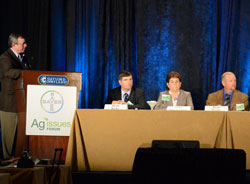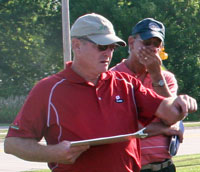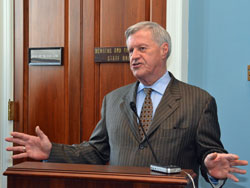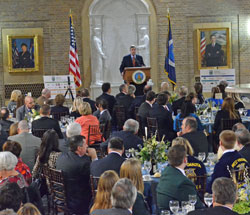In a letter to the Federal Communications Commission (FCC), agricultural and farm equipment organizations urged the agency to withdraw the conditional waiver granted to LightSquared in 2011 and modify the company’s satellite license to prohibit the building of a ground-based network.
 “We urge the FCC to adopt both proposals because of the overwhelming evidence that LightSquared’s proposed ground-based network would cause severe interference to virtually all uses of GPS,” the groups’ stated in a comment letter to the FCC. “High-precision GPS technology is vitally important to American agriculture, and would be gravely harmed by LightSquared’s plans.”
“We urge the FCC to adopt both proposals because of the overwhelming evidence that LightSquared’s proposed ground-based network would cause severe interference to virtually all uses of GPS,” the groups’ stated in a comment letter to the FCC. “High-precision GPS technology is vitally important to American agriculture, and would be gravely harmed by LightSquared’s plans.”
The letter was signed by the American Farm Bureau Federation, American Soybean Association, American Sugar Cane League, Association of Equipment Manufacturers, National Association of Wheat Growers, National Barley Growers Association, National Corn Growers Association, National Council of Farmer Cooperatives, National Potato Council, National Sunflower Association, US Canola Association, USA Dry Pea & Lentil Council, and the USA Rice Federation.
The groups described the benefits of high precision GPS to American agriculture as “immense and diverse,” saying that, “By enabling farmers to make precise applications for planting, irrigation, and crop protection, GPS technology has been responsible for remarkable growth in productivity, farm income, and improved environmental sustainability.” The petition cited an economic study which showed that precision GPs increased 2007-2010 crop yields by about $20 billion per year, the equivalent of nearly 12 percent of total annual production.
Last month, the National Telecommunications and Information Administration (NTIA) determined this week that the LightSquared plan to build a nationwide 4G broadband network will indeed impact “both general/personal navigation and certified aviation GPS receivers.” As a result of that finding, the FCC was expected to revoked the conditional waiver which was granted last year.
The groups added that they remain strong supporters of expanded broadband access in rural America. “However, expanded broadband access cannot come at the expense of degraded access to high precision GPS for U.S. farmers.”
 A coalition of environmental groups has filed lawsuits in New York and Louisiana to require the Environmental Protection Agency (EPA) under the Clean Water Act to address nitrogen and phosphorous runoff in the Mississippi River basin.
A coalition of environmental groups has filed lawsuits in New York and Louisiana to require the Environmental Protection Agency (EPA) under the Clean Water Act to address nitrogen and phosphorous runoff in the Mississippi River basin.
 A grower sustainability panel took place during the recent Bayer CropScience 2012 Ag Issues Forum with the theme of “Hands in the Dirt: First-Hand Grower Experiences.”
A grower sustainability panel took place during the recent Bayer CropScience 2012 Ag Issues Forum with the theme of “Hands in the Dirt: First-Hand Grower Experiences.”  The weed resistance revolt is growing and conditions this year are ripe for a bigger battle than ever against those rebellious yield robbers.
The weed resistance revolt is growing and conditions this year are ripe for a bigger battle than ever against those rebellious yield robbers. Those resistant pigweed species can produce “an absolutely crazy number” of 400,000-500,000 seeds per plant. “With that kind of seed production, it becomes a serious, serious weed especially when it becomes resistant to glyphosate,” he said, adding that giant ragweed is the other big concern.
Those resistant pigweed species can produce “an absolutely crazy number” of 400,000-500,000 seeds per plant. “With that kind of seed production, it becomes a serious, serious weed especially when it becomes resistant to glyphosate,” he said, adding that giant ragweed is the other big concern.

 Ag Leader Technology is offering current Case-IH AFS and New Holland PFS desktop software users the opportunity to convert to Ag Leader SMS desktop software. CNH AFS/PFS users that choose to convert will be assured continued SMS software updates and industry leading support directly from Ag Leader. Ag Leader and SMS will continue to support the CNH file formats and changes that occur with new display firmware releases.
Ag Leader Technology is offering current Case-IH AFS and New Holland PFS desktop software users the opportunity to convert to Ag Leader SMS desktop software. CNH AFS/PFS users that choose to convert will be assured continued SMS software updates and industry leading support directly from Ag Leader. Ag Leader and SMS will continue to support the CNH file formats and changes that occur with new display firmware releases. “We urge the FCC to adopt both proposals because of the overwhelming evidence that LightSquared’s proposed ground-based network would cause severe interference to virtually all uses of GPS,” the groups’ stated in a
“We urge the FCC to adopt both proposals because of the overwhelming evidence that LightSquared’s proposed ground-based network would cause severe interference to virtually all uses of GPS,” the groups’ stated in a 



 The Mississippi Delta is one of the largest contiguous coastal ecosystems in North America, boasting both ecological and economic value. The Delta hosts the United States’ largest fishery, by weight, and its port activity rivals those worldwide. The region also generates a significant portion of the United States’ energy and provides critical wildlife habitat.
The Mississippi Delta is one of the largest contiguous coastal ecosystems in North America, boasting both ecological and economic value. The Delta hosts the United States’ largest fishery, by weight, and its port activity rivals those worldwide. The region also generates a significant portion of the United States’ energy and provides critical wildlife habitat.